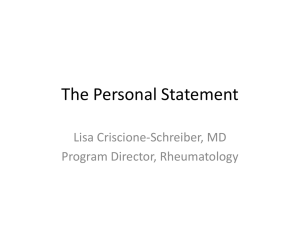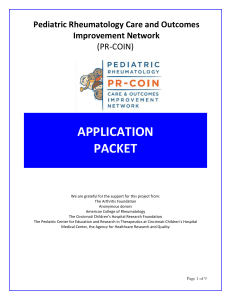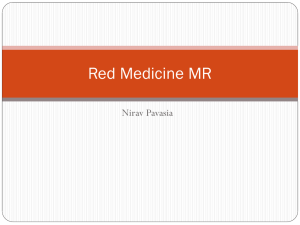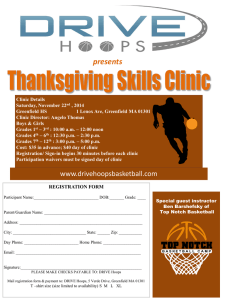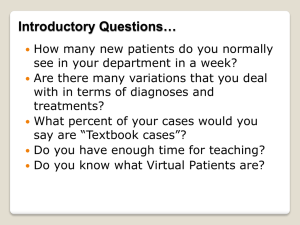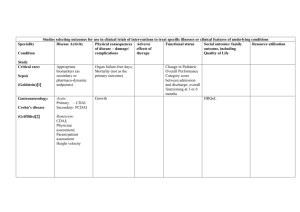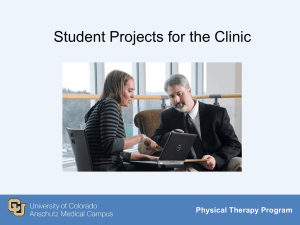Welcome to Rheumatology
advertisement
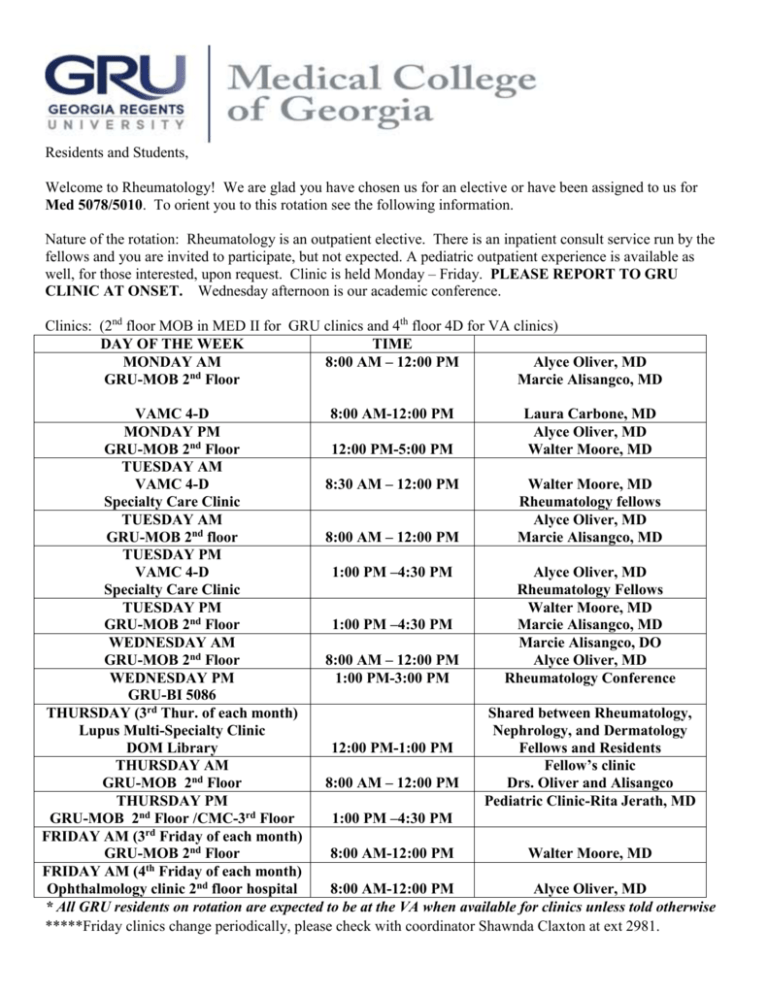
Residents and Students, Welcome to Rheumatology! We are glad you have chosen us for an elective or have been assigned to us for Med 5078/5010. To orient you to this rotation see the following information. Nature of the rotation: Rheumatology is an outpatient elective. There is an inpatient consult service run by the fellows and you are invited to participate, but not expected. A pediatric outpatient experience is available as well, for those interested, upon request. Clinic is held Monday – Friday. PLEASE REPORT TO GRU CLINIC AT ONSET. Wednesday afternoon is our academic conference. Clinics: (2nd floor MOB in MED II for GRU clinics and 4th floor 4D for VA clinics) DAY OF THE WEEK TIME MONDAY AM 8:00 AM – 12:00 PM Alyce Oliver, MD GRU-MOB 2nd Floor Marcie Alisangco, MD VAMC 4-D 8:00 AM-12:00 PM Laura Carbone, MD MONDAY PM Alyce Oliver, MD GRU-MOB 2nd Floor 12:00 PM-5:00 PM Walter Moore, MD TUESDAY AM VAMC 4-D 8:30 AM – 12:00 PM Walter Moore, MD Specialty Care Clinic Rheumatology fellows TUESDAY AM Alyce Oliver, MD nd GRU-MOB 2 floor 8:00 AM – 12:00 PM Marcie Alisangco, MD TUESDAY PM VAMC 4-D 1:00 PM –4:30 PM Alyce Oliver, MD Specialty Care Clinic Rheumatology Fellows TUESDAY PM Walter Moore, MD GRU-MOB 2nd Floor 1:00 PM –4:30 PM Marcie Alisangco, MD WEDNESDAY AM Marcie Alisangco, DO GRU-MOB 2nd Floor 8:00 AM – 12:00 PM Alyce Oliver, MD WEDNESDAY PM 1:00 PM-3:00 PM Rheumatology Conference GRU-BI 5086 THURSDAY (3rd Thur. of each month) Shared between Rheumatology, Lupus Multi-Specialty Clinic Nephrology, and Dermatology DOM Library 12:00 PM-1:00 PM Fellows and Residents THURSDAY AM Fellow’s clinic nd GRU-MOB 2 Floor 8:00 AM – 12:00 PM Drs. Oliver and Alisangco THURSDAY PM Pediatric Clinic-Rita Jerath, MD GRU-MOB 2nd Floor /CMC-3rd Floor 1:00 PM –4:30 PM FRIDAY AM (3rd Friday of each month) GRU-MOB 2nd Floor 8:00 AM-12:00 PM Walter Moore, MD FRIDAY AM (4th Friday of each month) Ophthalmology clinic 2nd floor hospital 8:00 AM-12:00 PM Alyce Oliver, MD * All GRU residents on rotation are expected to be at the VA when available for clinics unless told otherwise *****Friday clinics change periodically, please check with coordinator Shawnda Claxton at ext 2981. Faculty: Drs. Laura Carbone, Chief, Section of Rheumatology, Walter Moore (Associate Dean for GME), Alyce Oliver (Program Director for Rheumatology Fellowship), Marcie Alisangco, Joseph Bailey, Rita Jerath (Chief of Pediatric Rheumatology) Fellows: Drs. Kristin Etzkorn (senior fellow, pager 5934) and Wambui Machua (junior fellow, pager 6275) Administrative Assistant: Ms. Shawnda Claxton - Phone 1-2981/2982. Clinic Support Staff: Deirdre Bush, LPN and Ive Banks, nursing assistant. Clinic phone numbers: 1-1399, 1-1401 and 1-1403. Expectations: 1. Professionalism: Be in clinic on time. If you are going to be late or absent students, please notify Liz Jones in the clerkship office (1-2055), and residents please contact Michelle Torres in the housestaff office (1-2423), and Shawnda Claxton (1-2981/2982) in the Rheumatology office, or one of the faculty. All absences will need to be excused through the clerkship office/housestaff office. 2. Patient Care, Practice-Based Learning and Improvement, Systems Based Practice, and Communication Skills: Provide pertinent patient presentations. The nature of outpatient medicine does not always afford the luxury of lengthy patient encounters and thus not every patient encounter you have while on Rheumatology will result in as comprehensive a presentation as inpatient medicine. This does not mean that your presentations are not to be pertinent to the chief complaint or reason for follow up. Before you enter a patient’s room to begin your encounter, review the EHR (Powerchart or CPRS) and determine what occurred at the time of the last outpatient visit, including tests and therapeutic interventions, and discuss with the patient the result of such interventions, along with exploring any new concerns. When presenting to an attending or a fellow, be prepared. One should know the reason for follow up, results of tests and interventions and have explored the chief complaint. For patients new to the clinic, a full History and Physical will be conducted and results presented. Following the clinic visit, a complete note will be generated in the EHR and forwarded to the appropriate attending for review. 3. Medical Knowledge: Read: If you have spare time before presenting your patient read on your patient’s diagnosis or complaint in any our several textbooks or on-line sources (see Educational Resources below). In addition, it is expected you will read about your patient’s diseases after hours. If you are completing a one month rotation, you will be asked to give an informal discussion on a topic to your peers. 4. Med 5077: Senior students on outpatient medicine ½ day per week often ask how we decide whether they are meeting or exceeding expectations (B versus A level performance) when completing their clinic evaluation form. Unfortunately assignment of a particular grade can be rather subjective. To assist the senior student in achieving as high a grade as possible during their ½ day with us we have elaborated, in addition to what is already on the Med 5077 evaluation form, the following expectations in each of the four competencies that we feel differentiates the A from the B performance. a. Patient care: the student performing at an A level will have performed a complete (pertinent to the problem requiring referral) history and physical exam with a complete medication list (name, dose and frequency) on all new patients and will have reviewed the record and know all labs, imaging results and medications germane to the previous and current visits on all returning patients. b. Medical knowledge: knowing the answer to basic questions regarding rheumatology and its more common diseases and showing evidence that the senior student is reading in the area of rheumatology prior to and during clinic will constitute an A level performance. c. Professionalism: coming to clinic on time and showing an interest in learning as well as showing respect to your patients, peers and faculty on a consistent basis constitutes an A level performance. d. Communication skills: in addition to what is already listed on the Med 5077 evaluation form it is expected that the A level student will consistently have an organized and accurate presentation and will be able to articulate a reasonable assessment and plan for each of their patients. Learning objectives: During your time on Rheumatology Elective you will see many examples of the most common rheumatic diseases seen in the private practice of rheumatology as well as examples of less frequently seen diseases, unique to a tertiary care center. It is expected that you will develop a working knowledge of the classic presentations of the most common rheumatic diseases and a passing familiarity with the less common ones. This includes understanding the appropriate use of immunologic labs such as ANA, anti-CCP Ab, RF, ANCA, etc. Examples of diseases you can expect to see include but are not limited to osteoarthritis, rheumatoid arthritis, systemic lupus erythematosus, osteoporosis, Sjogren’s syndrome and systemic sclerosis. In addition you will see plenty of the common pain syndromes including fibromyalgia and chronic low back pain. Additionally, there will be the opportunity to learn and assist in procedures such as arthrocentesis. Educational resources: In the clinic you will find a copy of Harrison’s Rheumatology, Kelly’s Textbook of Rheumatology and Klippel’s Primer on the Rheumatic Diseases. A collection of rheumatology case studies is available on line through the American College of Rheumatology at www.rheumatology.org. Follow the link for professional education to online curriculum cases. Additionally, similar cases in print form (CARE, MKSAP, PowerPoint presentations) may be utilized and are located in the Rheumatology offices (BI5086). Rheumatology Fellowship opportunities: Travel scholarships to attend the annual national meeting are available from the American College of Rheumatology to students and residents interested in the field of Rheumatology. Inquiries to applying for and completing a rheumatology fellowship at GRU or abroad can be made to Dr. Oliver the Program Director for the Fellowship or to Dr. Walter Moore.
